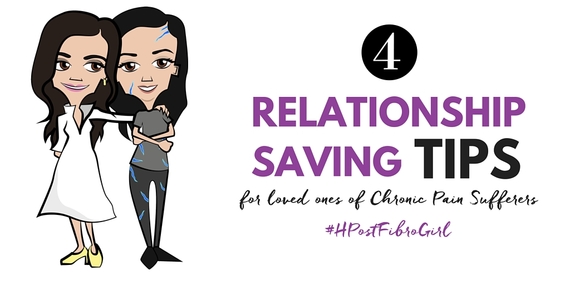"Me vs. Fibromyalgia" is an in-depth, one-of-a-kind series designed to give readers and warriors affected by Fibromyalgia a comprehensive look into the facts of the disease and the story of a woman who wouldn't take no for an answer. I've chronicled eight years of experience with Fibro including chronic pain, low energy, doctors, relationships and more, and hope to offer answers and support to those who seek them.
It is because of my incredible support system that I am able to live life with Fibromyalgia and still have all of my goals met and dreams come true. I'm able to share my journey and therefore, the burdens of Fibro.
One of my most beloved supporters, my sister, Priya, has created a compassionate list of tips that I hope will make it easier for my fellow Warriors to ask for what you need from your support system, or give you ideas for how you can support your Fibro Warrior.
4 Relationship Saving Tips for Loved Ones of Chronic Pain Sufferers
My sister Puja and I have always been very close. After college I moved in with her, and rediscovered that not she was not only my best friend, but my protector, and closest confidante. Soon after I moved out, my sister got into a very bad car accident, resulting in a herniated disc in her neck and a piece of her spine dislodging. After much suffering, several injuries, and a quest to find answers, she was diagnosed with Fibromyalgia.
I'm ashamed to admit that for a long time I didn't truly understand my sister's disease. I didn't understand that she was in intense pain every single day. It was difficult for her to communicate what was going on, and I really wasn't educated as well as I should have been on chronic pain.
Get educated here: Puja's Fibromyalgia Series on Huffington Post
I've come to realize that there are ways we can help our loved ones just by being there and understanding. So below are four ways I've learned to be more supportive of my loved one with chronic pain. 
1. Understand they are giving as much as they can.
As I mentioned above, for so long I didn't understand what my sister was going through. I didn't understand that she could only expend so much energy each day before her body shut down, or that certain noises or smells would exacerbate her pain, or that it's hard not to be a little cranky when every ounce of your body is in excruciating pain.
Instead of shutting down, open up to what your loved one is going through. Ask them questions with tangible answers, like what their pain level is that day or what they feel like participating in. And when you're spending time together, don't overwhelm their schedule!
In my sister's case she is a high-powered career woman who gives a lot to work despite her disease. When she's on vacation or spending time with her family, she needs to let her body rest, and for those around her, we need to allow her to do that, guilt-free.
2. Check in often but give them their space.
My sister and I are very close and we talk several times a week. But sometimes, she has a really intense pain week and just doesn't have the energy to be on the phone after she's already given so much to her job, husband and home. However, she does want to know that I'm thinking about her and appreciates when I check in.
Before I truly understood her pain, I would get bothered when she wouldn't initiate as many conversations or contact me as much. I thought she didn't have time for me, but now I realize she might not have it in her to talk that day, or that she is experiencing such a bad flare up that she can barely brush her teeth, let alone have a phone conversation. Giving space is just as important as checking in on their well-being.
3. Get educated on their condition.
This one is not solely on the person with chronic pain to educate you on their condition. It's also our responsibility to learn more about it. My sister sends my family articles and information on Fibromyalgia, but we have also taken it upon ourselves to seek out this information. It enhances our relationship with my sister and allows us to show her we care by truly trying to better understand what she goes through.
4. Relationships may be different, but different can still be good.
In fact, they may become better through communication and empathy.
As ridiculous as this sounds there were days when I was mad at the Fibromyalgia because I felt like it had stolen the relationship I had with my sister. It had robbed us of our daily conversations and frequent visits. Not to mention, how heartbreaking it was to see her in so much pain. But at the same time, the Fibro has also helped us learn more about each other, trust each other in brand-new ways, and communicate better than we ever have before. It's taken our support of each other to a whole new level, and for that I am so thankful.
I'm constantly in awe of my sister. Her strength and tenacity in the face of Fibromyalgia is nothing short of inspiring. She pushes herself more than anyone I know. Not only is she a successful career woman, but she founded the first women's alliance at her company, is an advocate for those with Fibromyalgia and chronic pain, and still manages to be a dedicated wife, daughter, and sister.
My only wish for her is that one day, they will find a cure for this and she will be pain-free.
You can find Priya's full piece on Model Behaviors here.
Do you suffer from chronic pain or have a loved one who suffers? What sort of tips and advice have you learned through your experiences? Please share them in the conversation below. I'm eager to hear them!
Coming up: Me vs. Fibromyalgia -- Interview with Marshall Field (...THE Marshall Field)
Disclaimer: I am not a doctor. All information presented should be regarded as friendly advice and opinions based on my own experience and research. I am not making an attempt to prescribe any medical treatment and the information contained in this blog is not intended to replace a one-on-one relationship with a doctor or qualified health practitioner.
Click here to read my last post, What Happened When I Tried Something TOTALLY Different
